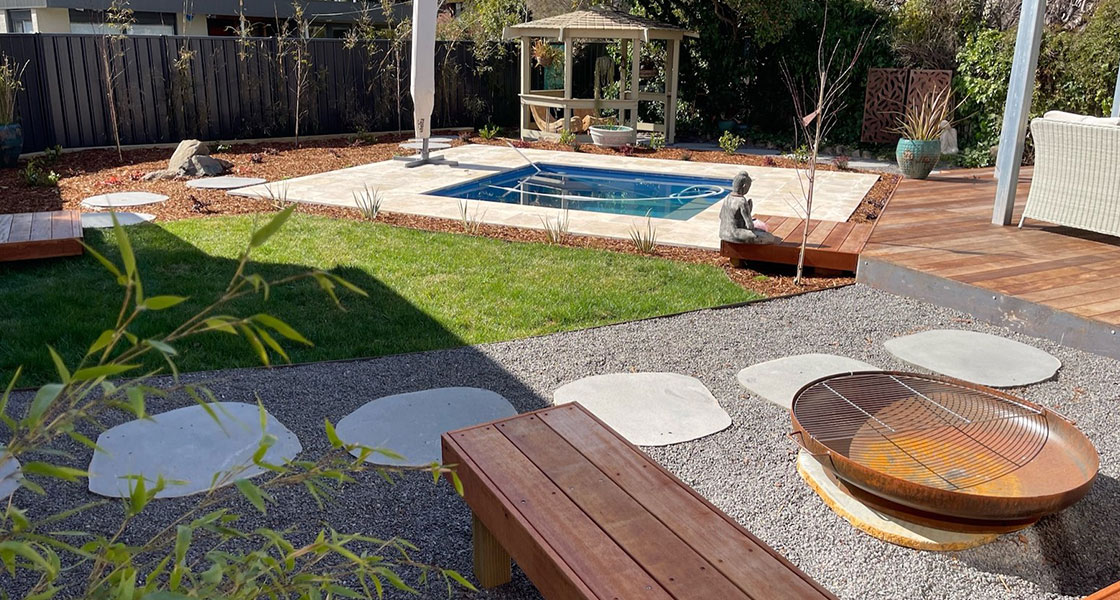Major Brand Suppliers






Services
Paving the Way to Striking, Functional Outdoor Spaces
From project inception to completion, we work to ensure your vision is executed without blowing past your budget, stepping on your creativity, or impacting the overall look and feel of your space.
Are you ready to add a beautiful, stylish, and versatility aspect to your outdoor space? Give your driveway, patio, backyard or outdoor space the care and attention it deserves with a call to the friendly and experienced team at Gardengigs.
Contact us now on 0417 164 406 to learn more about our extensive range of solutions.
Explore more services here:

How do I know if I need paving?
Deteriorating Surfaces: If your existing pathways, driveways, or parking areas show signs of wear and tear, such as cracks, potholes, or uneven surfaces, it’s a clear indication that they may need repaving.
Safety Concerns: Uneven or damaged pavements can pose safety hazards, increasing the risk of tripping or accidents. If you notice potential dangers like these, it’s time to consider this service.
Drainage Issues: Poorly drained surfaces can lead to water pooling or flooding during heavy rain. This service can help improve water runoff and prevent water-related damage.
Accessibility: If your property lacks suitable pathways or access points for pedestrians, cyclists, or people with disabilities, this service can enhance accessibility and compliance with regulations.
Enhancing Aesthetics: This service can significantly enhance the visual appeal of your property, adding value and curb appeal.
Upgrading Property Value: If you’re planning to sell or lease your property, this service can make it more attractive to potential buyers or tenants.
Increased Traffic: High foot or vehicular traffic may cause existing surfaces to wear out faster, necessitating paving to maintain durability.
What factors affect paving services cost?
The cost can vary widely depending on several factors, including the type of the material, the area to be paved, the complexity of the project, and local market rates. Here are some general cost estimates::
- The Material: The choice of material greatly influences the cost. For example, basic concrete is generally more affordable compared to premium options like natural stone or interlocking pavers.
- Labour Costs: Labour charges can vary based on the complexity of the project, site preparation requirements, and the expertise of the contractor.
- Site Conditions: If the site requires extensive preparation work, such as excavation, removal of existing materials, or grading, it can add to the overall cost.
- Size of the Area: Larger areas generally have a lower cost per square metre compared to smaller ones, as there are economies of scale in materials and labour.
- Design and Patterns: Custom designs or intricate patterns may increase the cost compared to standard layouts.
However, for specific quotes tailored to your needs and budget, reach out and speak to a member of the Gardengigs team today on 0417 164 406.

How long does paving take?
For smaller residential projects, such as driveway or a small pathway, the work may be completed within a few days, assuming weather conditions are favourable. On the other hand, larger projects like parking lots, commercial areas, or extensive pathways may take several weeks to complete.
Here’s a rough breakdown of the process and estimated timeframes:
Step One: Preparation
This phase involves site inspection, measuring the area, and preparing the base. It may take a day or two, depending on the size and complexity of the site.
Step Two: Excavation and Grading
If the site requires excavation or grading work, it could take an additional day or more, depending on the extent of the work needed.
Step Three: Base Installation
Installing the base materials like crushed rock or gravel is a crucial step in the process and may take a day or two, depending on the area’s size.
Step Four: Paving
The actual process may take a few days to a week, depending on the material, the area’s size, and the intricacy of the design.
Step Five: Curing Time
After the paving is complete, there is a curing period required for the material to set properly. This can take anywhere from a few days to a few weeks, depending on the type of material used.
Step Six: Finishing Touches
This includes any additional work like sealing the surface or adding special features, which may take a day or two.
How can I identify professional paving services?
✔ Experience and Reputation: Look for companies with a proven track record of successful projects in the Canberra area. Check online reviews, testimonials, and ask for references from previous clients to gauge their reputation.
✔ Licence and Insurance: A reputable contractor should have the necessary licences and insurance coverage, including liability and worker’s compensation insurance. This protects you from potential liabilities in case of accidents or damages during the project.
✔ Knowledge and Expertise: A professional company should have knowledgeable staff who can answer your questions and provide expert advice on material choices, design options, and best practices for your specific project.
✔ Portfolio of Past Work: Ask the contractor for a portfolio or examples of their previous projects. This will give you an idea of their workmanship and the range of projects they have handled.
Browse our completed projects here
✔ Transparent Pricing: A professional contractor will provide you with a detailed and transparent quote that includes all costs associated with the project, so you know what to expect upfront.
✔ Written Contract: Ensure that the contractor provides a written contract that outlines the scope of work, materials to be used, timeline, and payment terms. A written agreement protects both parties and prevents misunderstandings.
✔ Quality Materials and Equipment: Professional companies use high-quality materials and modern equipment to ensure durable and long-lasting pavement.
✔ Local Knowledge: A local contractor familiar with Canberra’s climate, soil conditions, and regulations is better equipped to handle any specific challenges that may arise.
✔ Warranty: Reputable contractors often offer a warranty on their work, giving you peace of mind that they stand behind their craftsmanship.
✔ Communication and Customer Service: A professional company will communicate clearly and promptly, addressing your concerns and keeping you informed throughout the project.
How long does paving typically last?
Asphalt: Well-constructed and properly maintained asphalt surfaces can last between 15 to 20 years. Regular maintenance, such as seal coating and timely repairs, can extend its lifespan.
Concrete: Concrete is a durable material with a longer lifespan than asphalt. A well-installed and well-maintained concrete pavement can last 25 to 30 years or more.
Interlocking Pavers: Interlocking concrete pavers are known for their durability and flexibility. When properly installed and maintained, they can last 20 to 30 years or even longer.
Brick Pavers: Brick pavers are highly durable and can have a lifespan similar to interlocking concrete pavers, lasting 20 to 30 years with proper care.
Natural Stone Pavers: Natural stone is one of the most long-lasting materials. Stone pavers can last 30 years or more, and their appearance tends to improve with age.
It’s important to note that the lifespan of paving can be affected by factors such as heavy traffic, harsh weather conditions, soil movement, and the quality of installation. Regular maintenance, such as sealing, patching cracks, and addressing drainage issues, can significantly extend the useful life of the pavement.

 Friendly Advice & Consultation
Friendly Advice & Consultation